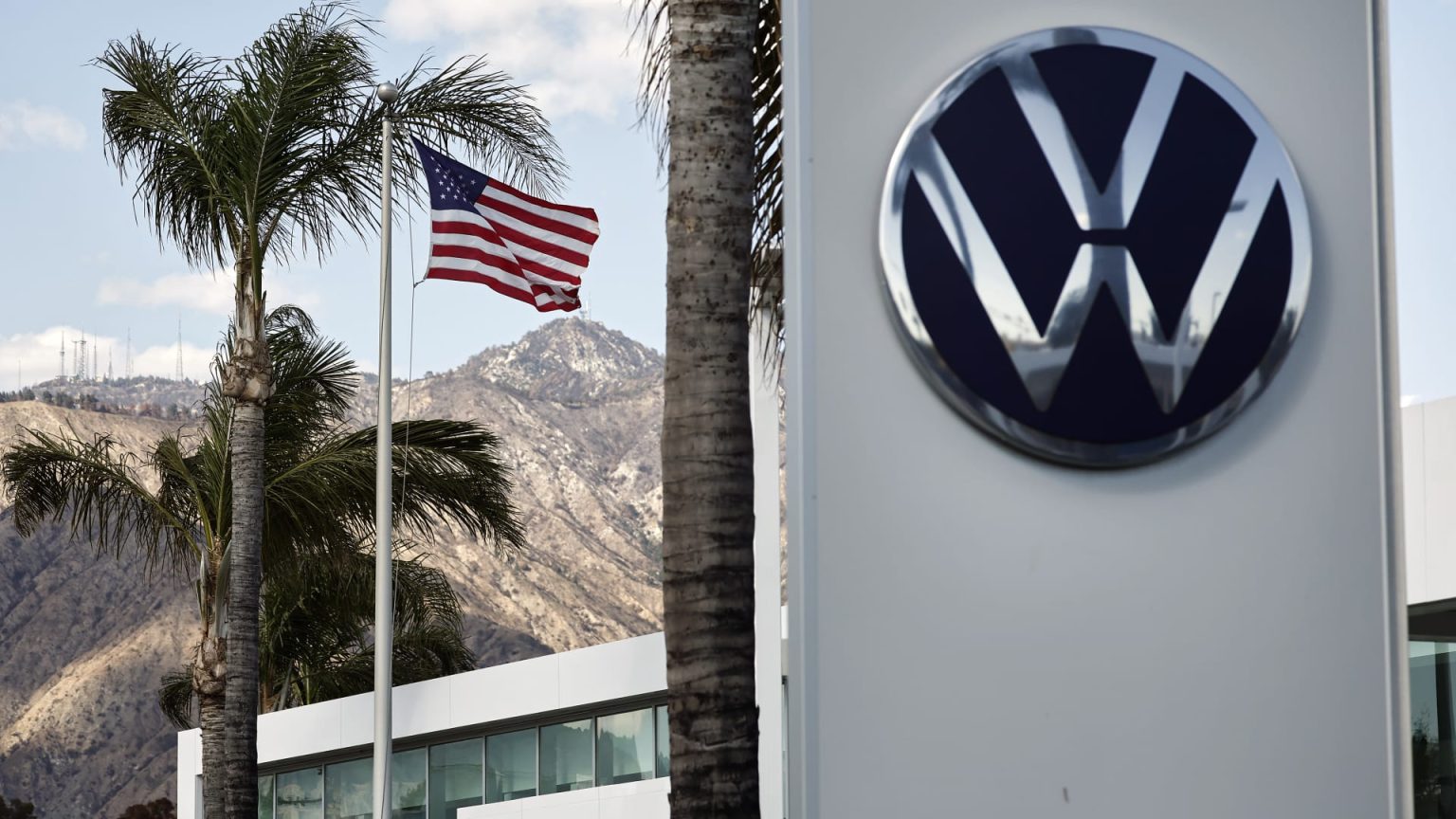Volkswagen has reported a significant decline in its first-quarter profits for 2025, attributing the downturn to the ongoing impact of U.S. tariffs and a volatile global economic climate. The German automaker announced an operating profit of 2.9 billion euros, a drastic drop of 37% compared to the same period last year. Despite this setback, Volkswagen’s sales revenue increased due to higher vehicle sales in markets outside China. As the company navigates these challenges, it remains focused on enhancing its competitive edge to adapt to rapidly changing market dynamics.
| Article Subheadings |
|---|
| 1) Analyzing the Profit Decline |
| 2) Sales Performance and Market Trends |
| 3) The Effect of Tariffs on the Automotive Industry |
| 4) Future Projections Amidst Uncertainty |
| 5) Conclusion and Implications for Stakeholders |
Analyzing the Profit Decline
Volkswagen’s reported operating profit of 2.9 billion euros for the first quarter of 2025 signals a considerable decline from the previous year’s results, where it reached 4.59 billion euros. This downturn reflects a broader trend impacting not only Volkswagen but the entire automotive sector. Analysts largely credit this dip to a variety of factors, including increased operational costs and market volatility spurred by geopolitical tensions.
The current economic climate, characterized by fluctuating currency values and rising material costs, has impeded the company’s profitability. Volkswagen’s Chief Financial Officer, Arno Antlitz, noted that the company is working diligently to manage its competitive cost base even as external market conditions present challenges. The drop in profit has left stakeholders and investors questioning the company’s strategy as it navigates these turbulent waters.
Sales Performance and Market Trends
Despite the profit decline, Volkswagen reported a slight increase in sales revenue, achieving 77.6 billion euros in the first quarter of 2025, a growth of 2.8% compared to the same period in 2024. The company highlighted that the sales figures were buoyed by stronger demand in markets outside of China, where it has seen a shift in consumer preference towards its vehicle offerings.
Volkswagen recorded approximately 2.1 million vehicle sales during the first quarter—an increase of 0.9% from the first three months of the previous year. Additionally, order intakes for vehicles in Western Europe surged by an impressive 29% year-on-year, showcasing a potential recovery in that critical market. This positive note in sales indicates that, while profits may be down, consumer interest in Volkswagen’s robust vehicle lineup remains steady.
The Effect of Tariffs on the Automotive Industry
The decline in profits coincides with the uncertainty surrounding U.S. tariffs on imported vehicles—a significant concern for manufacturers reliant on cross-border supply chains. The automotive sector has been particularly vulnerable due to the intricate global relationships forged within manufacturing operations. According to reports, U.S. President Donald Trump recently signed an executive order aimed at reducing certain auto tariffs. However, the continuation of a 25% tariff on vehicle imports complicates the scenario.
The new measures introduced by the White House intend to mitigate the stacking effect of increased tariffs on steel and aluminum, which have affected overall vehicle production costs. Nonetheless, the automotive industry remains in a tight spot, facing a dual threat of rising costs and reduced profitability due to tariffs designed to protect domestic production. Stakeholders worry that these tariffs will exacerbate the challenges already facing global manufacturers like Volkswagen.
Future Projections Amidst Uncertainty
Looking ahead, Volkswagen projects that its operating return on sales, net cash flow, and net liquidity will fall at the lower end of annual forecasts. This cautious outlook stems from several factors, including ongoing political uncertainty, rising trade restrictions, and stringent emissions regulations. The company’s ability to adapt to these changing conditions will be crucial for its future profitability.
In light of these challenges, Volkswagen plans to focus on enhancing its existing product offerings while also exploring cost-adjustment measures to maintain its competitive edge. By prioritizing operational excellence and maintaining a flexible approach in manufacturing, Volkswagen aims to navigate these turbulent times effectively.
Conclusion and Implications for Stakeholders
In conclusion, Volkswagen’s downturn in profits serves as a barometer for the struggles faced by the automotive industry at large. While the company has recorded an increase in sales, the significant drop in operating profit indicates that concerns over tariffs and market volatility are impacting the bottom line. Stakeholders, ranging from investors to consumers, will be closely watching how Volkswagen responds to these challenges and what measures it implements to secure its foothold in a rapidly evolving market landscape.
| No. | Key Points |
|---|---|
| 1 | Volkswagen reported a 37% decline in operating profits for the first quarter of 2025. |
| 2 | Sales revenue increased by 2.8%, attributed to strong market performance outside China. |
| 3 | Political and economic uncertainties, including U.S. tariffs, are contributing to lower profitability expectations. |
| 4 | Volkswagen plans to focus on complementing its product range with a competitive cost base. |
| 5 | Stakeholders are concerned about Volkswagen’s future strategies amid increasing market volatility. |
Summary
The significant drop in Volkswagen’s first-quarter profit highlights the precarious state of the automotive industry amidst evolving market conditions and regulatory challenges. While the company has noted higher sales revenue, the overarching narrative remains one of caution and adaptability. Moving forward, how effectively Volkswagen navigates these challenges will be crucial to its success and to the broader automotive landscape.
Frequently Asked Questions
Question: How has Volkswagen’s profit changed compared to last year?
Volkswagen’s operating profit decreased by 37% in the first quarter of 2025 compared to the same period in the previous year.
Question: What factors contributed to the rise in sales revenue?
The increase in sales revenue was largely attributed to stronger vehicle sales in markets outside of China.
Question: What are Volkswagen’s future expectations regarding financial performance?
Volkswagen expects that its operating return on sales, net cash flow, and net liquidity will come in at the lower end of annual forecasts due to uncertainty from tariffs and market volatility.


